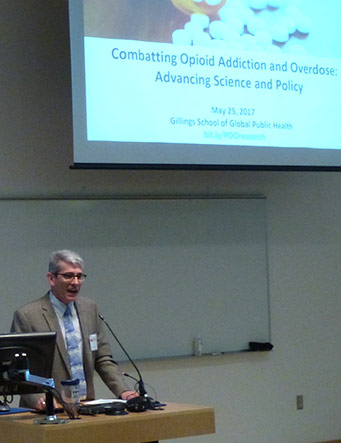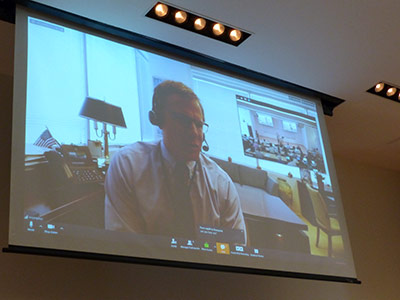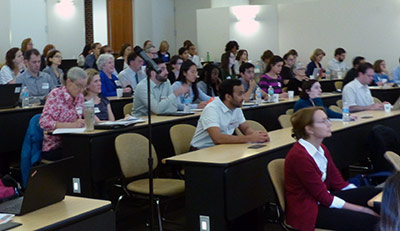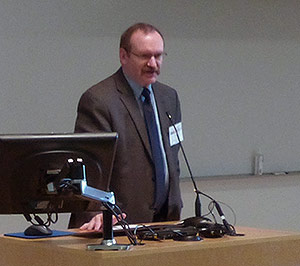Symposium Gathers Teams of Researchers to Address Opioid Addiction and Overdose
Drug overdoses are among the few causes of death on the rise, and now kill more people than guns or motor vehicles. From 2014 to 2015 alone, the number of drug deaths in North Carolina increased by 22%, over half attributed to opioids, a class of drugs that includes both illegal (such as illicit heroin) and prescription (such as morphine, hydrocodone, and prescription fentanyl) substances.

At a recent symposium, UNC epidemiologist Steve Marshall urged some 100 physicians, public health researchers, basic scientists, and pharmacists, to put their heads together to come up with solutions for what many call the worst drug crisis in American history.
"Think about how much was done to prevent motor vehicle deaths — seat belts, modifications to roads and cars, driver training," said Marshall, who directs the UNC Injury Prevention Research Center. "We need to build up that kind of commitment to prevent drug overdoses, from a research standpoint. If one of us was going to solve this on our own, that would have happened a long time ago. That is why team science is so important."
Marshall made his comments at "Combating Opioid Addiction and Overdose: Advancing Science and Policy," a five-hour symposium held on Thursday, May 25 in the Blue Cross Blue Shield Auditorium at Rosenau Hall on the UNC campus. The event — which was organized by the North Carolina Translational and Clinical Sciences (NC TraCS) Institute, the UNC Gillings School of Global Public Health, the UNC Injury Prevention Research Center, and Sheps Center for Health Services Research — was explicitly designed to bring together cross-disciplinary researchers to discuss and examine different ways to address the epidemic.

The day began with an overview of the funding climate by William Compton, MD, MPE, from the National Institute on Drug Abuse (part of the NIH), and Tamara Haegerich, PhD, from the National Center for Injury Prevention and Control (part of the CDC). Haegerich explained that a confluence of factors has given rise to the opioid epidemic, such as an overabundant supply of these "popular" drugs. She emphasized that states with more opioid pain reliever sales tend to have more drug overdose deaths. Haegerich said the CDC is ramping up their efforts to track opioid-involved overdoses, committing $12.8 million last fall to enhanced surveillance in 12 states.
Compton's address underscored the importance of team collaboration science in overcoming the current crisis. He focused on five priority areas: advancing the practice of pain management, expanding availability and distribution of treatments (like naloxone) for opioid overdoses, expanding access to treatment and recovery services, strengthening public health surveillance, and supporting cutting edge research.

After the introduction by the funders, attendees divided into two tracks. In one track, the audience learned more about issues relating to the opioid crisis, including ongoing efforts in North Carolina for prevention, advocacy, and treatment; about transitions from opioid addiction to other health problems; and the biological, clinical, etiological, social, and policy-related aspects of the problem.
In his talk on the history of opioid disorders, Mark Edlund, MD, PhD, a senior public health analyst at RTI, lent some perspective by quoting the 17th century English physician Thomas Syndenham: "Among the remedies which it has pleased Almighty God to give to man to relieve his sufferings, none is so universal and so efficacious as opium." Of all the drugs in the modern pharmacopeia, Edlund noted, opioids are the oldest. But the problems they present for patients, and society in general, are very current.
In a separate track, investigators worked in interdisciplinary teams to develop research ideas in the following areas: the importance of big data; community-driven approaches in urban and rural populations; pre-clinical research; clinical research; and the intersection between the opioid epidemic and HIV/hepatitis C.
At the end of the meeting, representatives from each group presented a summary of their work to the entire gathering, highlighting the strengths, weaknesses, opportunities, threats, and needs they identified in their specific theme area and potential projects they would like to pursue in the future. For example, investigators engaged in the clinical research working group proposed studying cognitive and psychosocial approaches to decrease morbidity associated with narcotics.

David Peden, MD, Director of Team Science at NC TraCS, concluded the meeting by offering to help the teams push their ideas forward. "For those of you who are here looking for research partners or funding mechanisms, our service is very eager to help in that process," he said. "We can help you make connections, or identify which picture frames you should put around your research ideas. We want to continue this conversation outside the walls of this conference."
For more information on how scientists can end the opioid epidemic, visit directorsblog.nih.gov.
To access more research and resources on the crisis provided by the UNC Injury Prevention Research Center, visit iprc.unc.edu.
To learn more about efforts to promote Team Science at NC TraCS, visit tracs.unc.edu/team-science.
NC TraCS is the academic home of the NIH Clinical and Translational Science Awards (CTSA) at the University of North Carolina at Chapel Hill. The CTSA program is led by the NIH's National Center for Advancing Translational Sciences (NCATS). NC TraCS combines the research strengths, resources and opportunities of UNC, its new partner RTI International (RTI) and planning partner North Carolina Agricultural and Technical State University (N.C. A&T) to accelerate clinical and translational research from health science discovery to dissemination to patients and communities.